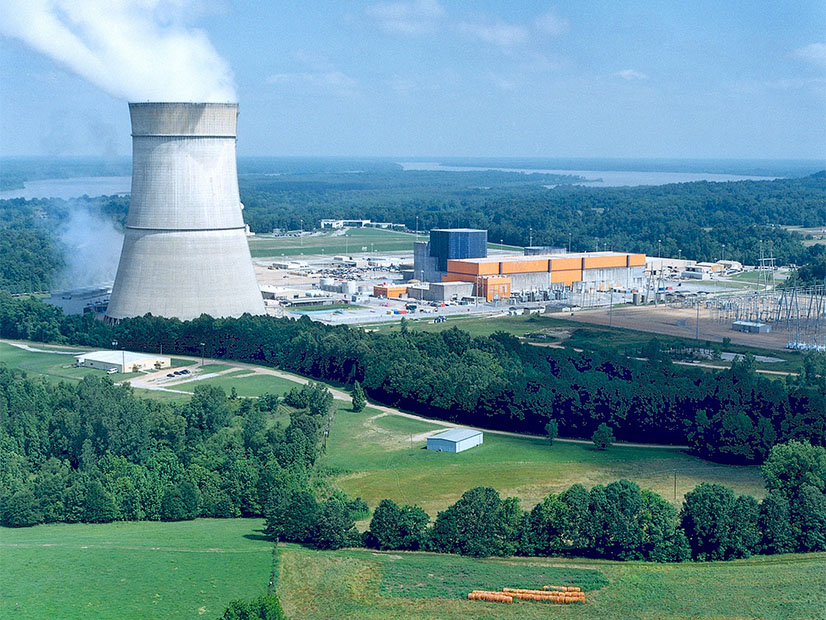A former employee of Entergy’s Grand Gulf Nuclear Station testified last week that he witnessed mismanagement by plant supervisors and was fired for refusing to revise audits documenting problems.
Jairus Greene testified Dec. 12 at the request of the Louisiana Public Service Commission, which is seeking millions in refunds from Entergy over alleged mismanagement of the 1,443-MW plant (EL21-56).
Testifying at the law offices of Stone Pigman Walther Wittmann in New Orleans, Greene said he witnessed poor engineering decisions, frequent reactor trips and scrams — or the sudden shutting down of a nuclear reactor — exemplified by Grand Gulf’s unusually low capacity factor. At one point, Greene said he couldn’t recall the length of individual outages because trips were commonplace. From 2016 through 2018, Grand Gulf ran at about a 55.5% capacity factor when other nuclear plants in the nation averaged over 92%, according to data from the U.S. Energy Information Administration.
Entergy says it has improved the plant’s operations, touting its 95% capacity factor in 2021. The utility also said Grand Gulf attained the highest rank in the Nuclear Regulatory Commission’s performance matrix in 2022.
Greene, who has more than 20 years’ experience in nuclear capital projects and cybersecurity, worked at Grand Gulf for about three years before he was fired in April 2022.
Greene spoke carefully during his deposition, acknowledging he lacked first-hand knowledge of some of what he reported, which came from other employees.
He said he believed security personnel at the plant worked shifts that were too long and they had no time for bathroom breaks. Employees found human excrement in some areas of the plant, he said.
He said he was aware of Grand Gulf’s poor reputation when he was hired. He “was kind of ashamed to admit” he worked in “a place like this,” he testified.
Greene said Grand Gulf leadership choose not to conduct engineering hold points — a pause on construction activities until an inspection is passed — as part of a turbine controls project in 2020.
Greene said he was concerned that some equipment considered critical digital assets at other reactors he worked at wasn’t considered such at Grand Gulf.
He also said there seemed to be numerous maintenance deferrals throughout his employment.
Greene said he took his concerns over pressures to issue more favorable audit findings and a chilled work environment to the Nuclear Regulatory Commission.
Greene said he and other employees would meet informally at a nearby supermarket to discuss their concerns over the plant. Some colleagues left their positions to avoid compromising their integrity, he said.
Greene said shortly after he wrote a memo on security lapses, he found his security clearance revoked. Shortly after, he was fired.
However, Greene said he still believes in nuclear power though some utilities don’t operate plants reliably.
In March, Greene filed a federal lawsuit against Entergy in the Southern District of Mississippi alleging he was fired for refusing to falsify safety reports (5:23-cv-00016). He contends he used legally prescribed THC derivatives to treat severe glaucoma and that Entergy used the pretext of a failed drug test to fire him in retaliation. He said he has never used marijuana.
Entergy spokeswoman Mara M. Hartmann declined to comment Monday on Greene’s allegations, citing “pending legal matters.”
“Entergy is committed to the safe, secure and reliable operation of our plants in compliance with all applicable NRC regulations, including the NRC’s fitness-for-duty requirements,” she said. “We are proud that our Grand Gulf Nuclear Station has all green, or best possible, performance indicators in the regulatory performance matrix.”
Greene’s deposition came in a long-running dispute between Entergy and state regulators. Entergy subsidiary System Energy Resources Inc. operates and owns 90% of Grand Gulf and sells the plant’s output to Entergy’s Arkansas, Louisiana, Mississippi and New Orleans affiliates.
The Louisiana PSC maintains that ratepayers are owed hundreds of millions of dollars because Entergy mishandled plant operations, undertook an expensive and excessive plant expansion, and engaged in improper accounting and tax violations that shifted costs to ratepayers.
FERC has ruled against Entergy on some tax maneuvers and lease payment collections in another proceeding, though the exact amount owed is still up for debate. Louisiana regulators are asking FERC to fine Entergy $1 million a day for refusing to pay the refunds. (See Latest FERC Order on Grand Gulf Nuclear Plant Ambiguous on Refund Amount.)
Last month, Louisiana Public Service Commissioner Davante Lewis told The Times-Picayune/The New Orleans Advocate that it seems “Entergy is playing a legal maneuver that basically tries to bully us and wear down the clock.”
In October, the Arkansas Public Service Commission accepted Entergy’s $142 million offer to settle its claims, a year after turning down the same offer. Entergy estimates it has already refunded $50 million of that amount to Arkansas, according to a filing with the U.S. Securities and Exchange Commission.
Mississippi settled its claims related to Grand Gulf in 2022, accepting a $300 million refund. (See Entergy Offers Regulators $588M to End Grand Gulf Complaints.)
During a third-quarter earnings call last month, Entergy CEO Drew Marsh said the deals with Arkansas and Mississippi resolve approximately two-thirds of the financial risks related to lawsuits over Grand Gulf. Marsh also warned that reaching a resolution in the FERC cases could take up to two years.
Grand Gulf, the largest single-unit nuclear plant in the U.S., began commercial operations in 1985. In 2016, the NRC granted the plant a 20-year license extension, allowing it to operate through 2044.




